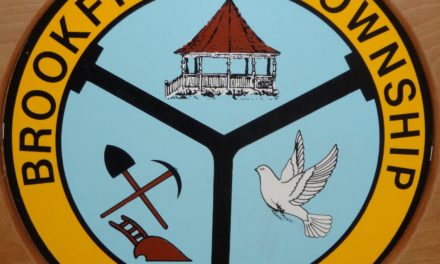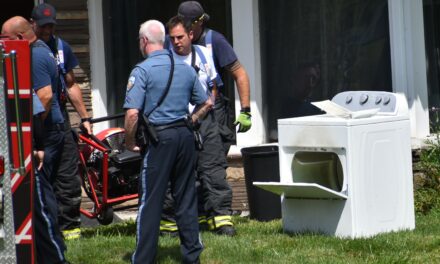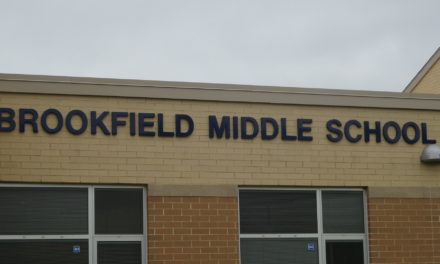“We knew when we took this case there were gonna be some issues,” Scott Essad said during his closing argument in the breach of contract trial between Brookfield’s two grocery stores.
The major issue was that there was nothing in writing between the parties, said Essad, who represented Anthony and Teresa Modarelli of P&T Management Co. Inc., owners of Brookfield Sparkle Market.
While Essad argued that oral contracts are still valid, seven members of the eight-person jury agreed that Larry and Ed D’onofrio of E.L.D. D’onofrio Inc. had not made a deal to sell Mr. D’s Delicious Fresh Foods to the Modarellis.
In Trumbull County civil trials, only six of the eight jurors have to agree to render a verdict.
While the D’oniofrios were talking about a deal with the Modarellis, they also were talking to Dhru and Kinjan Patel, and ultimately sold the store to the Patels’ company, 7156 K.D. Brothers Inc., which now runs the store.
The Modarellis had planned to close Mr. D’s.
“It’s important for people to keep their word and, in this case, I don’t think that happened, despite the jury’s verdict,” Essad said of the outcome of the case. “That worries me about society in general, and about these two grocery stores in particular. I wish the best for both of them.”
A message left for Kevin Murphy, who represented the D’onofrios, was not returned.
The trial was held Oct. 16-18 before Trumbull County Common Pleas Court Judge Andrew Logan.
Logan threw out a claim of fraud brought by the Modarellis and a counterclaim brought by the D’onofrios that the suit was frivolous, leaving only the matter of breach of contract for the jury to decide. The jury of six women and two men took about an hour to deliberate.

Logan told the jury that a contract can be “oral, written or implied,” and that the jurors could consider the words said by the parties, their conduct and their acts in determining whether a contract existed.
The essential terms of a contract include the identity of the parties, the subject matter and the consideration, but they are not necessarily the only essential terms, Logan said.
Murphy argued the identity of the parties wasn’t even specified because a draft of a sales agreement listed the D’onofrios as individuals being the sellers instead of their company. The D’onofrios wanted to limit any liability that might arise from selling as individuals, Larry D’Onofrio, the younger of the brothers, said.
Tony Modarelli, whose company also owns Sparkle Markets in Warren, Boardman and Reynolds, Pa., said he was interested in buying and closing Mr. D’s because he doesn’t think the market would support two grocery stores. The market, which is dominated by working-class people, shrank by 5 percent in the past year, he said.
“By buying out the D’onofrios, it would have made Sparkle a stronger store.” he said.
Tony Modarelli was initially contacted in 2021 by a consultant who had been working on behalf of the D’onofrios. After looking over the Mr. D’s financials, Modarelli said he determined he could pick up at least 40 percent of Mr. D’s sales, equaling a profit of about $175,000 a year.
By making more money, the Modarellis would have been able to put more money into the community by supporting community and school groups, Modarelli said.
An attorney representing the Modarellis drew up the draft sales agreement, and the Modarellis and the D’onofrios met at Squaw Creek in May or June 2022 to discuss details. There were items in the draft that the D’onofrios didn’t like, such as a clause that had the Modarellis paying $500,000 at closing and $500,000 over time.
“I stated at that meeting, anything they didn’t like in that contract, they can take it out,” Modarelli said. “I was willing to sign it that day.”
Modarelli met the terms raised by the D’onofrios, he said, including agreeing to pay $1 million at closing – he got a bank loan to cover half the purchase price – and to hire all of the Mr. D’s employees who wanted to work for Sparkle. The parties also agreed on the ownership of vehicles owned by Mr. D’s, the disposal of inventory and equipment and a closing date in July 2022, he said.
“When you left that meeting, did you think you’d come to an agreement?” Essad asked.
“Yes, I did,” Modarelli said.
“What did they (D’onofrios) tell you?” Essad continued.
“Basically, ‘We’ll be in touch and we’ll see you on the’” closing date, Modarelli said.
Modarelli said he had bought other stores without a signed sales agreement, just a signed supplier agreement.
If the sides had come to an agreement, why did the lawyers representing each side continue to talk after the meeting at Squaw Creek? Murphy asked.
“Because we had to have a lawyer finalize things,” Modarelli said. “They had to take out everything the D’onofrios didn’t want.”
Larry D’onofrio called the Squaw Creek meeting “really a fact-finding meeting for us.”
“We were negotiating with two people,” he said.
The draft sales agreement tendered by the Modarellis’ attorney was “complex,” Larry D’onofrio said, noting he had never seen anything so detailed before.
“You gotta read it five or six times to understand what it means,” he said.
Unresolved issues included how the D’onofrios were going to dispose of equipment Modarelli did not want, holdback – any money destined for the D’onofrios that would be held in escrow for a time to cover lawsuits or other claims filed after the sale – and intellectual property, such as recipes and the Mr. D’s website, the D’onofrios said.
The D’onofrios said they did not believe they had a contract until they signed a document.
“If you don’t sign a contract, everything is hearsay,” Ed D’onofrio said.
“It has to be written in the contract, because then you’re stuck with it,” Larry D’onofrio said.








